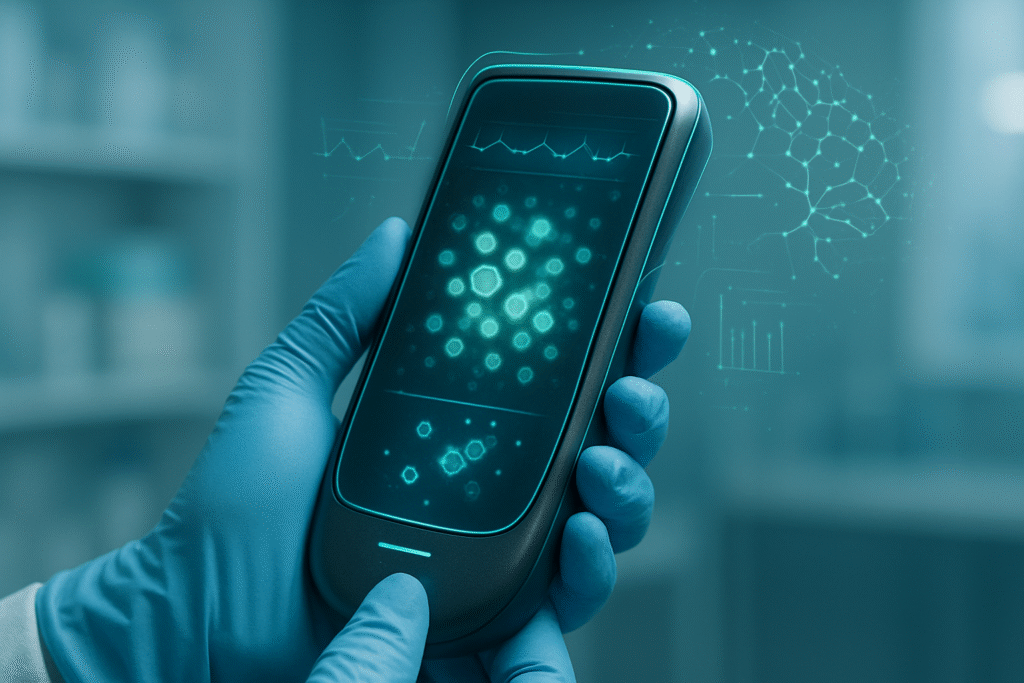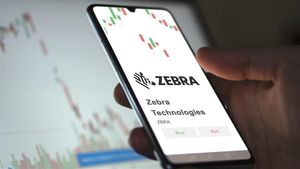
In a monumental stride towards democratizing global healthcare, researchers at the University of Liverpool have announced the development of a pioneering low-cost, handheld, AI-powered blood test designed for the early detection of Alzheimer's disease biomarkers. This groundbreaking innovation, widely reported between October 1st and 6th, 2025, promises to revolutionize how Alzheimer's is diagnosed, making testing as accessible and routine as monitoring blood pressure or blood sugar. By bringing sophisticated diagnostic capabilities out of specialized laboratories and into local clinics and even homes, this development holds immense potential to improve early intervention and care for millions worldwide grappling with this debilitating neurodegenerative condition.
The immediate significance of this announcement cannot be overstated. Alzheimer's disease, affecting an estimated 55 million people globally, has long been challenged by the high cost, complexity, and limited accessibility of early diagnostic tools. The University of Liverpool's solution directly addresses these barriers, offering a beacon of hope for earlier diagnosis, which is crucial for maximizing the effectiveness of emerging treatments and improving patient outcomes. This breakthrough aligns perfectly with global health initiatives advocating for more affordable and decentralized diagnostic solutions for brain diseases, setting a new precedent for AI's role in public health.
The Science of Early Detection: A Deep Dive into the AI-Powered Blood Test
The innovative diagnostic platform developed by Dr. Sanjiv Sharma and his team at the University of Liverpool's Institute of Systems, Molecular and Integrative Biology integrates molecularly imprinted polymer-based biosensors with advanced artificial intelligence. This sophisticated yet user-friendly system leverages two distinct sensor designs, each pushing the boundaries of cost-effective and accurate biomarker detection.
One study detailed the engineering of a sensor utilizing specially designed "plastic antibodies" – synthetic polymers mimicking the binding capabilities of natural antibodies – attached to a porous gold surface. This ingenious design enables the ultra-sensitive detection of minute quantities of phosphorylated tau 181 (p-tau181), a critical protein biomarker strongly linked to Alzheimer's disease, directly in blood samples. Remarkably, this method demonstrated an accuracy comparable to high-end, often prohibitively expensive, laboratory techniques, marking a significant leap in accessible diagnostic precision.
The second, equally impactful study, focused on creating a sensor built on a standard printed circuit board (PCB), akin to those found in ubiquitous consumer electronics. This PCB-based device incorporates a unique chemical coating specifically engineered to detect the same p-tau181 biomarker. Crucially, this low-cost sensor effectively distinguishes between healthy individuals and those with Alzheimer's, achieving performance nearly on par with the gold-standard laboratory test, SIMOA (Single Molecule Array), but at a substantially lower cost. This represents a paradigm shift, as it brings high-fidelity diagnostics within reach for resource-limited settings.
What truly sets this development apart from previous approaches and existing technology is the seamless integration of AI. Both sensor designs are connected to a low-cost reader and a web application that harnesses AI for instant analysis of the results. This AI integration is pivotal; it eliminates the need for specialist training to operate the device or interpret complex data, making the test user-friendly and suitable for a wide array of healthcare environments, from local GP surgeries to remote health centers. Initial reactions from the AI research community and medical experts have been overwhelmingly positive, highlighting the dual impact of technical ingenuity and practical accessibility. Many foresee this as a catalyst for a new era of proactive neurological health management.
Shifting Tides: The Impact on AI Companies, Tech Giants, and Startups
The advent of a low-cost, handheld AI-powered blood test for early Alzheimer's detection is poised to send ripples across the AI industry, creating new opportunities and competitive pressures for established tech giants, specialized AI labs, and agile startups alike. Companies deeply invested in AI for healthcare, diagnostics, and personalized medicine stand to benefit significantly from this development.
Pharmaceutical companies and biotech firms (NASDAQ: BIIB), (NYSE: LLY) focused on Alzheimer's treatments will find immense value in a tool that can identify patients earlier, allowing for timely intervention with new therapies currently in development or recently approved. This could accelerate drug trials, improve patient stratification, and ultimately expand the market for their treatments. Furthermore, companies specializing in medical device manufacturing and point-of-care diagnostics will see a surge in demand for the hardware and integrated software necessary to scale such a solution globally. Firms like Abbott Laboratories (NYSE: ABT) or Siemens Healthineers (ETR: SHL), with their existing infrastructure in medical diagnostics, could either partner with academic institutions or develop similar technologies to capture this emerging market.
The competitive implications for major AI labs and tech companies (NASDAQ: GOOGL), (NASDAQ: MSFT) are substantial. Those with strong AI capabilities in data analysis, machine learning for medical imaging, and predictive analytics could pivot or expand their offerings to include diagnostic AI platforms. This development underscores the growing importance of "edge AI" – where AI processing occurs on the device itself or very close to the data source – for rapid, real-time results in healthcare. Startups focusing on AI-driven diagnostics, particularly those with expertise in biosensors, mobile health platforms, and secure data management, are uniquely positioned to innovate further and potentially disrupt existing diagnostic monopolies. The ability to offer an accurate, affordable, and accessible test could significantly impact companies reliant on traditional, expensive, and centralized diagnostic methods, potentially leading to a re-evaluation of their market strategies and product pipelines.
A New Horizon: Wider Significance in the AI Landscape
This breakthrough from the University of Liverpool fits seamlessly into the broader AI landscape, signaling a pivotal shift towards practical, impactful applications that directly address critical societal health challenges. It exemplifies the growing trend of "AI for good," where advanced computational power is harnessed to solve real-world problems beyond the realms of enterprise efficiency or entertainment. The development underscores the increasing maturity of AI in medical diagnostics, moving from theoretical models to tangible, deployable solutions that can operate outside of highly controlled environments.
The impacts of this technology extend far beyond individual patient care. On a societal level, earlier and more widespread Alzheimer's detection could lead to significant reductions in healthcare costs associated with late-stage diagnosis and crisis management. It empowers individuals and families with critical information, allowing for proactive planning and access to support services, thereby improving the quality of life for those affected. Economically, it could stimulate growth in the medical technology sector, foster new job creation in AI development, manufacturing, and healthcare support, and potentially unlock billions in productivity savings by enabling individuals to manage their health more effectively.
Potential concerns, while secondary to the overwhelming benefits, do exist. These include ensuring data privacy and security for sensitive health information processed by AI, establishing robust regulatory frameworks for AI-powered medical devices, and addressing potential biases in AI algorithms if not trained on diverse populations. However, these are challenges that the AI community is increasingly equipped to address through ethical AI development guidelines and rigorous testing protocols. This milestone can be compared to previous AI breakthroughs in medical imaging or drug discovery, but its unique contribution lies in democratizing access to early detection, a critical bottleneck in managing a global health crisis.
The Road Ahead: Exploring Future Developments and Applications
The unveiling of the AI-powered Alzheimer's blood test marks not an endpoint, but a vibrant beginning for future developments in medical diagnostics. In the near-term, we can expect rigorous clinical trials to validate the device's efficacy across diverse populations and healthcare settings, paving the way for regulatory approvals in major markets. Simultaneously, researchers will likely focus on miniaturization, enhancing the device's portability and user-friendliness, and potentially integrating it with existing telehealth platforms for remote monitoring and consultation.
Long-term developments could see the expansion of this platform to detect biomarkers for other neurodegenerative diseases, such as Parkinson's or multiple sclerosis, transforming it into a comprehensive handheld neurological screening tool. The underlying AI methodology could also be adapted for early detection of various cancers, infectious diseases, and chronic conditions, leveraging the same principles of accessible, low-cost biomarker analysis. Potential applications on the horizon include personalized medicine where an individual's unique biomarker profile could guide tailored treatment plans, and large-scale public health screenings, particularly in underserved communities, to identify at-risk populations and intervene proactively.
However, several challenges need to be addressed. Scaling production to meet global demand while maintaining quality and affordability will be a significant hurdle. Ensuring seamless integration into existing healthcare infrastructures, particularly in regions with varying technological capabilities, will require careful planning and collaboration. Furthermore, continuous refinement of the AI algorithms will be essential to improve accuracy, reduce false positives/negatives, and adapt to evolving scientific understanding of disease biomarkers. Experts predict that the next phase will involve strategic partnerships between academic institutions, biotech companies, and global health organizations to accelerate deployment and maximize impact, ultimately making advanced diagnostics a cornerstone of preventive health worldwide.
A New Era for Alzheimer's Care: Wrapping Up the Revolution
The University of Liverpool's development of a low-cost, handheld AI-powered blood test for early Alzheimer's detection stands as a monumental achievement, fundamentally reshaping the landscape of neurological diagnostics. The key takeaways are clear: accessibility, affordability, and accuracy. By democratizing early detection, this innovation promises to empower millions, shifting the paradigm from managing advanced disease to enabling proactive intervention and improved quality of life.
This development’s significance in AI history cannot be overstated; it represents a powerful testament to AI's capacity to deliver tangible, life-changing solutions to complex global health challenges. It moves beyond theoretical discussions of AI's potential, demonstrating its immediate and profound impact on human well-being. The integration of AI with sophisticated biosensor technology in a portable format sets a new benchmark for medical innovation, proving that high-tech diagnostics do not have to be high-cost or confined to specialized labs.
Looking ahead, the long-term impact of this technology will likely be measured in improved public health outcomes, reduced healthcare burdens, and a renewed sense of hope for individuals and families affected by Alzheimer's. What to watch for in the coming weeks and months includes further details on clinical trial progress, potential commercialization partnerships, and the initial rollout strategies for deploying these devices in various healthcare settings. This is more than just a scientific breakthrough; it's a social revolution in healthcare, driven by the intelligent application of artificial intelligence.
This content is intended for informational purposes only and represents analysis of current AI developments.
TokenRing AI delivers enterprise-grade solutions for multi-agent AI workflow orchestration, AI-powered development tools, and seamless remote collaboration platforms. For more information, visit https://www.tokenring.ai/.





